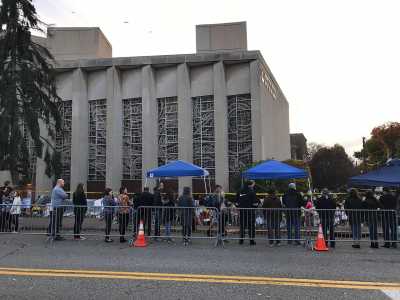One year after synagogue shooting, the Institute trains Pittsburgh teachers on using testimony to prompt difficult conversations

Leading up to the one-year anniversary of the deadly synagogue shooting in Pittsburgh, USC Shoah Foundation staff members trained educators in that metro area last week about how to use video testimonies of Holocaust witnesses as a tool to teach empathy, understanding and respect.
Although the professional-development event at the Holocaust Center of Pittsburgh on Oct. 25 wasn’t tied to the Oct. 27 anniversary, the horrific attack in which a gunman opened fire and killed 11 worshipers at the Tree of Life synagogue was on the minds of many teachers who participated, said Lesly Culp, the Institute’s head of education program.
“One teacher felt that students were really apathetic,” she said, adding that many young people lack awareness about antisemitism, which was the driving force behind the attack.
Using IWitness – USC Shoah Foundation’s signature online education program – Culp showed the nine participating teachers how Holocaust testimony can bridge the divide between past and present – and between different groups of people who have experienced persecution.
Most of the teachers work at schools in underserved parts of Pittsburgh, where the student-base is predominantly African American.
Culp showed the teachers a pair of clips that complement one another:
- Elizabeth Holtzman, a former Congresswoman (N.Y.) who gave an oral-history testimony to USC Shoah Foundation testimony about her experience prosecuting Nazi leaders and working for civil rights leaders in the South
- Leon Bass, an African American World War II veteran who helped liberate the Buchenwald concentration camp in Germany, only to return home to face discrimination after the war.
“The circumstances of these two people is vastly different, but they fought for the same things,” Culp said.
Holtzman, Culp noted, is white and never faced discrimination for the color of her skin or her religion. And yet she chose to fight for equality.
“We call her an upstander,” Culp said.
Bass’s journey involves a paradox: He voluntarily enlisted to fight for a country that discriminated against him.
“His fight was from a very personal perspective,” she said.
In keeping with the Institute’s mission to localize content for teachers, Culp also showed testimony clips of several Holocaust survivors who resettled in Pittsburgh. Among them was Judah Samet, a Tree of Life congregant who was uncharacteristically late to synagogue on Oct. 27, 2018 – by four minutes. The mishap may have saved his life.
Samet gave his testimony to USC Shoah Foundation in 1997.
Culp led the teachers through the IWitness exercise called “Contemporary Antisemitism,” which includes testimony clips of Jews whose lives were forever changed when a gunman opened fire at a bat mitzvah at a Danish synagogue in 2015, killing a security guard and wounding two police officers.
“Antisemitism might not be a term that many students are familiar with,” Culp said. “They may have some antisemitic jokes they throw around, but they may not understand the history of it.”
Finally, she taught teachers how to create their own IWitness activities.
The teachers, she said, were quick to grasp the unique ability of testimony to engage students and instill empathy.
One teacher announced his intention to use a clip of Paul Parks – an African American liberator of a concentration camp who was banned from the dormitories at Purdue University in the early 1940s – to supplement his unit on the writer Langston Hughes.
“The testimonies lend teachers and students the opportunity to have difficult-but-important conversations,” Culp said.
Like this article? Get our e-newsletter.
Be the first to learn about new articles and personal stories like the one you've just read.